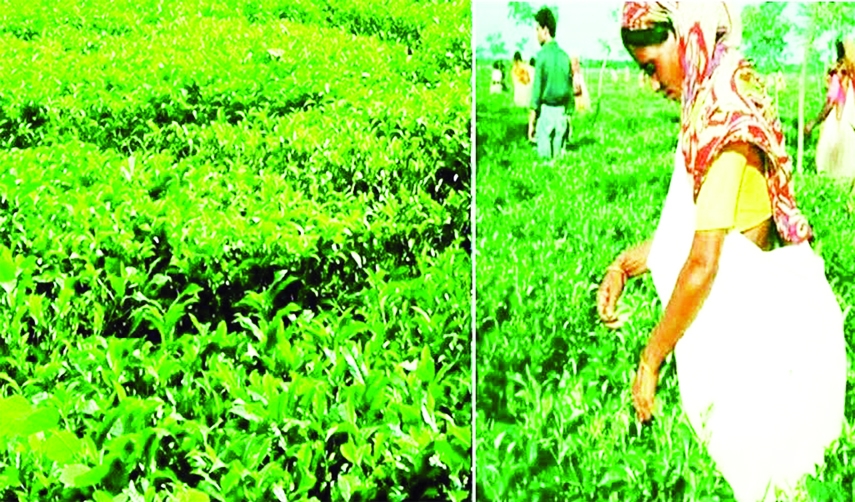
BSS, Rangpur :
The robust tea farming as nonconventional agriculture is bringing lucrative profits to farmers, changing rural economy and creating employments improving the living standard of people in five northern districts.
Senior Scientific Officer of Bangladesh Tea Board (BTB) at its Panchagarh Regional Office Dr Mohammad Shameem Al Mamun said tea cultivation on plain lands is rapidly expanding in the ‘Kartoa Valley’ ecological zone comprising five northern districts.
“Over 30,000 people, mostly women, are earning better wages from farm-activities and plucking tea-leaves to lead a better life in Panchagarh, Thakurgaon, Dinajpur, Nilphamari and Lalmonirhat districts of the valley,” Shameem said.
As a result of expanding tea farming, the ‘Kartoa Valley’ witnessed an all- time record production of 14.54 million kgs of processed tea in 2021, higher by 4.24 million kgs against the production of 10.30 million kgs of processed tea in the previous 2020 year.
“Owners of nine registered and 21 unregistered tea gardens and 8,067 smallholders cultivated tea on 11,434 acres of land in 2021, higher by 1,264 acres against 10,170 acres of land in 2020,” he said.
The production of green tea leaves stood at 73.57 million kgs in 2021 against51.28 million kgs in 2020 in the valley.
Twenty-two companies operating in Panchagarh, Thakurgaon and Lalmonirhat processed 73.57 million kgs of green tea leaves producing 14.54 million kgs of processed tea which is 15 percent against the total national production of 96.506 million kgs in 2021.
Shameem said the then Panchagarh Deputy Commissioner Rabiul Islam planted tea saplings on Circuit House premises on experimental basis after being directed by Prime Minister Sheikh Hasina during her visit to Panchagarh in 1996.
Getting better results, a BTB team conducted a feasibility study in Panchagarh and Thakurgaon in 1999 and found 16,000 hectares of land suitable for commercial basis tea cultivation.
Tentulia Tea Company Limited (TTCL) first started commercial basis tea cultivation on plain lands in Tentulia upazila of Panchagarh in 2000.
Witnessing the success of TTCL, other companies and farmers started tea farming on plain lands in 2005 ushering a new era in the agro-economy alongside creating huge jobs.
“Getting necessary assistance from the government, farmers are enhancing tea cultivation in five northern districts every year and getting more profits alongside creating huge jobs for local people,” Dr. Shameem added.
Like many other farmers, Mohammad Shahinur Rahman of village Buraburi in Tentulia upazila of Panchagarh said he started ‘small-scale gardening-basis’ tea cultivation on his land in 2016.
“I am now cultivating tea on 6.50 acres of land and selling green tea-leaves to tea processing companies to earn excellent profits,” Shahin said, adding that many male and female workers are working in his tea fields and earning better wages.
Farmer Matiar Rahman of village in Panchagarh said he started tea farming on his 4.50 acres of plain land in 2002.
“After getting repeated bumper output with lucrative prices every year, I am currently cultivating tea on about 60 acres of land,” Rahman said.
Farmer Ansar Ali of village Kajirhat in Panchagarh Sadar said he began farming tea on 33 decimals of land in 2017 and sold 1,300 kgs of green tea leaves at Taka 33 per kg for the first time after two years in 2019.
“Currently, I am cultivating tea on my two acres of land and selling 6,000 kgs of green tea leaves at Taka 1.20 lakh every time of six times annually,” he said.
Farmer Imran Ali Chowdhury of village Pediagochh Majhipara in Tentulia upazila of Panchagarh said he has expanded tea farming on 8.50 acres of land now, although he began tea farming on 1.90 acres of land in 2005.
“I am earning huge profits and 23 local men and women are working as farm-labourers in my tea fields,” he said.
Farm-labourers Ayesha, Halima, Sufia, Saleha, Morsheda and Motiar Rahman of different northern areas said they are leading a better life by earning Taka 500 to Taka 600 per day from plucking tea-leaves even during the Covid-19 pandemic.

